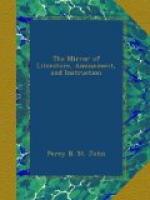An hospital was established some short time since in the neighbourhood of London for the purpose of experiment, and it was ascertained by actual computation, and by comparison with the bills of mortality, that an average number of persons will reach a greater age by observing strictly a vegetable diet.
Compared with the English, the French have a greater proportion of arable land than pasture, and consequently they rear fewer cattle, yet they have a thriving population, and that would hardly be if they were stinted in quality or quantity of food. The Irish peasantry live principally on potatoes, yet they have seldom been found fault with as labourers, and seem to be a well-built and able-bodied race of men. But we have not only sufficient proof of the beneficial effect of vegetable aliment—there are many instances on record, if we had time or space for them—to show how detrimental the contrary regimen has sometimes been. One example is worth mentioning: a man was prevailed on by a reward to live upon partridges without any vegetables, but he was obliged to desist at the end of eight days, from the appearance of strong symptoms of putrefaction.
That we live upon meat, and yet increase in growth and strength is little to the point, but whether we might not be still better without it; dogs thrive upon flesh, but biscuits are better for them: that we are fond of it is still less pertinent, for who does not know that custom alters nature itself, that it becomes, in fact, a second nature, and that such things as we are accustomed to, though actually evil in their own nature, yet become gradually less offensive, and at last pleasant. We have very remarkable proofs of this in all parts of the world. In China they eat cats and dogs, while the poorer classes think rats, mice, and other vermin, no bad food. The Romans thought peacocks a dainty, which we quite nauseate. The Greenlander and the Esquimaux relish train-oil, whilst these and all savages, on first tasting our wines are disgusted and spit them out. Horse-flesh is commonly sold in the markets of the north. Then again, there are some wandering Moors, who subsist entirely on gum senegal, and there have been many cases of shipwreck where the mariners have even subsisted for weeks on old shoes, tobacco, or whatever they could get; in short, what cannot custom effect? The Turk, by constant habit, is enabled to take opium in quantities that would soon destroy us; and every one must have known private cases where individuals in this country could take laudanum in surprising doses; we have all more or less experienced the power of habit in our acquired tastes, and whether we derive pleasure from the fumes of tobacco, or approve the flavour of olives, we may remember that at first we disliked, or were indifferent about either. History itself informs us, that Mithridates was able to drink poison; and there was a female slave, sent to Alexander by King Porus, who was even brought up with it from




